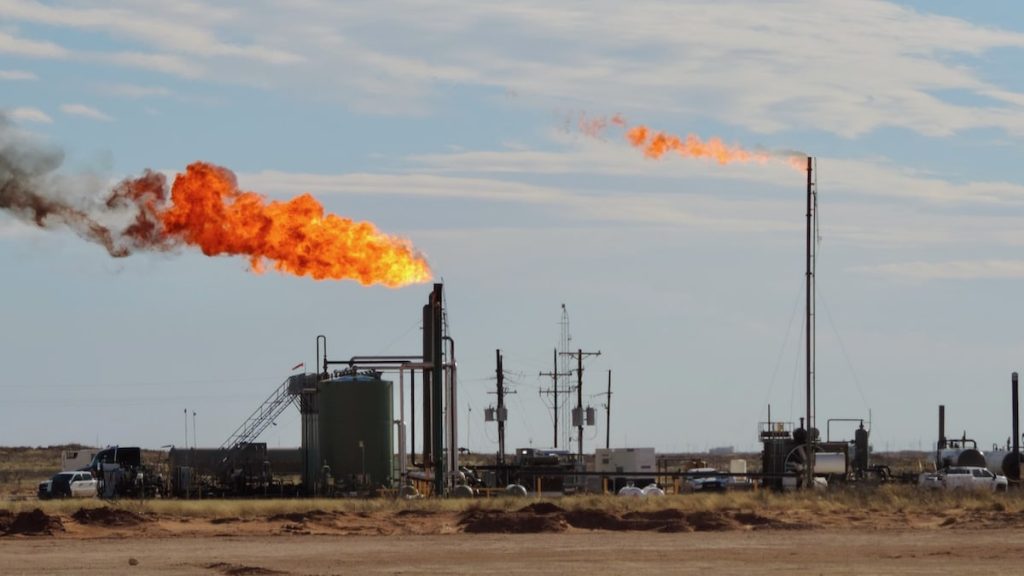Methane Emissions Worldwide Rising at Fastest Pace in Decades, Study Finds
4 min read
Methane gas flares at an EOG well site in Cotton Place, New Mexico on Feb. 6, 2023. WildEarth Guardians
Founded in 2005 as an Ohio-based environmental newspaper, EcoWatch is a digital platform dedicated to publishing quality, science-based content on environmental issues, causes, and solutions.
According to a new study, global methane emissions are “rising rapidly” — at the fastest pace in decades — with immediate action needed to help curtail a dangerous intensification of the climate crisis.
The study outlines three “imperatives” for reducing methane emissions, as well as a new tool to assist nations with optimizing cost-effective methods to reduce their methane emissions, an explainer from Frontiers said.
The actions called for by the study’s authors include reversing methane emissions growth, aligning carbon dioxide and methane mitigation and optimizing policies and technologies for the abatement of methane at the global, national and sector levels.
A potent greenhouse gas, methane is responsible for roughly half of global heating since preindustrial times. Methane emissions have gone up quickly since 2006, with record emissions in 2021 and 2022.
The study, “The methane imperative,” was published in the journal Frontiers.
The rise of methane emissions has been much more rapid than models predicted and, if it is not addressed, jeopardizes the world’s ability to meet its climate goals. On the other hand, methane reduction is a cost-effective strategy to rapidly reduce planetary warming.
Methane affects human health and agriculture by contributing to the development of ground-level ozone. It causes cardiovascular disease and respiratory illness, as well as premature deaths in adults and children under five, particularly in low- and middle-income nations. Ozone also harms plants, reducing crop yields.
Methane emissions have been increasing dramatically since 2006. According to the report, emissions will keep rising through the 2020s if new measures are not taken to curb them.
The world has been focusing on carbon dioxide as the main culprit in increasing global temperatures, but not as much has been done about methane, though it is 80 times more potent during the first two decades after it gets into the atmosphere.
“The growth rate of methane is accelerating, which is worrisome,” said Drew Shindell, Duke University climate scientist and the study’s lead author, as The Guardian reported. “[J]ust in the last few years we’ve had this huge dump of methane. It’s made the job of tackling anthropogenic warming all the more challenging.”
This decade, methane emissions worldwide have typically increased by roughly 30 million tons annually over the previous decade. There is no one clear explanation for the trend, but scientists have identified some contributing factors.
Methane is released during the processing of gas, oil and coal, and there has been a jump in fracking leading to a boom in gas projects this century. Livestock also emit methane — mostly from cow burps — and there has been an increase in animal agriculture, along with expanded rice production.
Increasing global temperatures are also leading to the more rapid decomposition of wetlands organic matter, which also releases methane.
The 2021 Global Methane Pledge aims to reduce methane emissions by a total of 30 percent by 2030. The initiative has spread to 155 countries, but just 13 percent of methane emissions are being addressed by current policies, with two percent of climate finance globally being put toward emissions reductions, the report said.
“I don’t think that target is necessarily out of reach yet but we have to redouble our efforts to get there,” Shindell said. “Countries are leading with oil and gas regulations, but it’s a challenge to get rules in place, and when it comes to livestock that’s just unpalatable to most governments, they just don’t want to touch it.”
Methane emissions dissipate much more quickly than carbon dioxide, which can linger for hundreds or even thousands of years if it is not removed from the atmosphere. In contrast, if humans eliminated all methane emissions, 90 percent of the methane that had accumulated in the atmosphere would be gone within 30 years.
“Methane is the strongest lever we can quickly pull to reduce warming between now and 2050,” Shindell said, as reported by The Guardian.” We’ve already seen the planet warm so much that if we are to avoid worse impacts we have to reduce methane. Reducing CO2 will protect our grandchildren – reducing methane will protect us now.”
Subscribe to get exclusive updates in our daily newsletter!
By signing up, you agree to the Terms of Use and Privacy Policy & to receive electronic communications from EcoWatch Media Group, which may include marketing promotions, advertisements and sponsored content.





